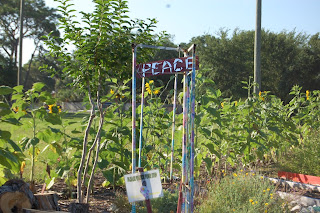The St. Petersburg, Florida school is a test plot for the Values Project Roundtable's budding philosophy. Kip Curtis, a Roundtable member and professor of environmental studies at Eckerd College, started an organic garden there in 2009 as an opportunity to educate youth about the long lost skill of growing food, as well as to experiment with the Roundtable's ideas.
Lakewood is somewhat of an unlikely place for a project like this sprout from. It is one the most at-risk schools in St. Petersburg, populated by many of the city's poorest kids. Relatively recently, the school got an entire new batch of teachers after failing the state's standardized exams. And prior to the garden, the PTA was quite lackluster, according to Curtis.
The project, called the Edible Peace Patch, is a cooperative learning endeavor between Lakewood and Eckerd that began as a response to Curtis' students curiosity about organic farming. “Most of them have a romanticized idea about agriculture, but have never done it, which is why they have a romanticized idea about it," he said.
 |
| Eckerd students ready the garden |
Curtis would know. He grew up on a sustainable farm in Massachusetts, daily performing the rituals of farm chores. While he loathed the agrarian life as a child, he realized in adulthood that it had planted the seeds for his environmental ethic. His hope is that Peace Patch will grow not just vegetables, but also a set of environmental ethics that the students will carry throughout their lives.
The garden provides experiential education for both college and elementary students. Under Curtis' leadership, Eckerd college students manage the garden and mentor the Lakewood students, teaching them about organic gardening and related science concepts. The project also recently gained a wellness kitchen, started by a graduate student intern, where the Lakewood kids get to learn how to cook the food they've grown.
 |
| Learning to cook |
Through the Peace Patch, these students get to encounter the hard work required to feed oneself, as well as learn that working with the land requires cooperation--not just between people, but also between people and the landscape. Herein lies the Roundtable's underlying principle of confronting the limitations of our own existence. We can't live without hard work, each other, and the land.
 |
| Cooperation! |
With enthusiasm, Curtis explained that the project has generated an unlikely community. Upper class, white college students and poor, minority elementary kids are forming meaningful relationships with one another, when they probably would have never otherwise interacted.
Community-making is further enhanced with a harvest festival, which the students organize to celebrate the end of the long growing season (long, thanks to Florida's climate). While the PTA used to have difficulty pulling parents to their events, the festival drew more than 200 people in its first year, according to Curtis, whose own kids attend Lakewood.
For Curtis, the Peace Patch exemplifies how interwoven people and the environment are--the health of one is dependent on the health of the other.
The Peace Patch offers a promising glimpse into what the Roundtable's philosophy could look like on the ground. I also find it hopeful that such a project seems easily replicable and maintainable. If you want to learn more about the Peace Patch and follow its progress, check out their blog.
Curtis leads another project with which he is testing out the Roundtable's philosophy: the restoration of a natural area on Eckerd's campus. Since I talk more about this project in a longer article I am working on (and hoping to get published), I won't delve into that one here.
And so ends my series about the Values Project Roundtable, but they are certainly a group to keep an eye out for.
*All photos courtesy of Edible Peace Patch.



No comments:
Post a Comment